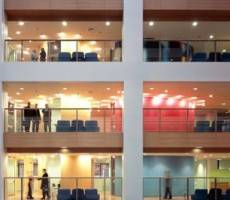March 25, 2015
HSBC to relocate its UK headquarters building to Birmingham
 Banking giant HSBC has announced the relocation of its core banking business for personal and business customers to the Arena Central development in Birmingham. The move will see the bank take a long term lease on a 210,000 sq. ft. office and relocate around a thousand employees to the new headquarters building from London over the next four years. The choice of location follows a review into the bank’s operations and its ability to service the needs of some 16 million customers in the UK. The West Midlands is the UK’s second largest financial centre after London, with some 220,000 employees across the region. Two years ago, Deutsche Bank completed a deal for 200,000 sq. ft. of new space at Brindleyplace and earlier this year, the local council announced plans for the Snow Hill area in an attempt to create an alternative to London’s Docklands.
Banking giant HSBC has announced the relocation of its core banking business for personal and business customers to the Arena Central development in Birmingham. The move will see the bank take a long term lease on a 210,000 sq. ft. office and relocate around a thousand employees to the new headquarters building from London over the next four years. The choice of location follows a review into the bank’s operations and its ability to service the needs of some 16 million customers in the UK. The West Midlands is the UK’s second largest financial centre after London, with some 220,000 employees across the region. Two years ago, Deutsche Bank completed a deal for 200,000 sq. ft. of new space at Brindleyplace and earlier this year, the local council announced plans for the Snow Hill area in an attempt to create an alternative to London’s Docklands.


























